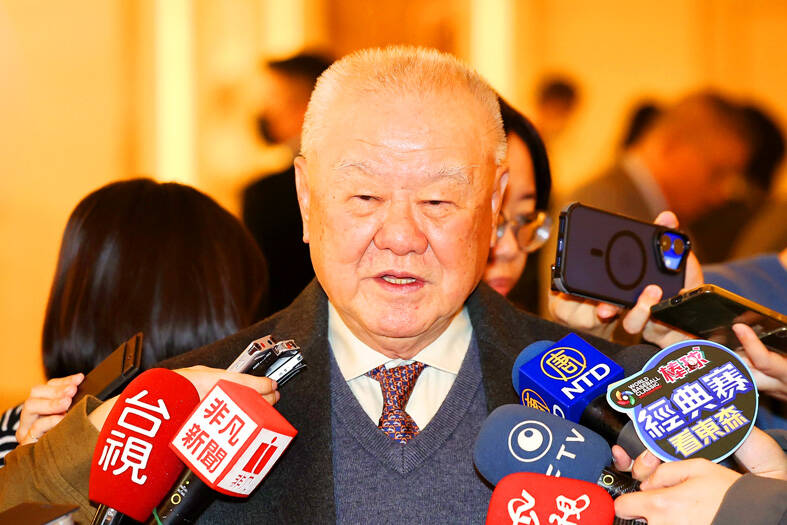Business leaders in Taiwan yesterday voiced deep concern that US tariff challenges would sap GDP growth this year by half and that a planned subsidy for small and medium-sized enterprises would be inadequate to help them weather the storm.
Lin Por-fong (林伯豐), chairman of the Third Wednesday Club (三 三會), urged the government to take swift and decisive action to support domestic businesses facing unprecedented pressure from escalating US tariffs and global economic uncertainty.
Taiwan’s GDP growth might have difficulty reaching 1.5 percent this year, falling far short of the government’s 3 percent projection, Lin told a monthly gathering in Taipei.

Photo: CNA
“The US government’s unpredictable tariff decisions, including the imposition of a 32 percent tariff on Taiwanese goods, are placing a heavy and unreasonable burden on local firms,” he said, calling for a coordinated rescue plan for affected sectors.
He urged the government to offer income tax incentives, reduce commodity taxes, remove stamp duties and lower import tariffs, particularly on raw materials and vehicles.
The government could provide financial tools such as increased loan access and interest rate cuts to ease corporate burdens, Lin said.
Lin called on the government to support trade with China, which is Taiwan’s largest trading partner representing 31 percent of outbound shipments last year, compared with the US, which accounted for 23 percent of Taiwan's overall exports.
The government should also consider pushing back carbon taxes until 2027 to align with the EU’s Carbon Border Adjustment Mechanism, he added.
Meanwhile, firms should invest in innovation and seek to raise added value through research and development, he said.
Kinpo Group (金仁寶集團) founder Rock Hsu (許勝雄) said that while larger corporations have the capacity to adapt, small and medium-sized enterprises (SMEs) face existential threats.
The government should expand its NT$88 billion (US$2.71 billion) relief package — two or threefold — and application details be disclosed without delay, Hsu said.
“The tariff challenge is not simply a trade issue,” he said. “It is a geopolitical struggle between the US and China, which might not subside ahead of the US midterm elections next year.”
The government must act quickly to shore up businesses, especially SMEs, so that they can weather the storm, he said.
If the US implements the 32 percent "reciprocal" tariffs on Taiwanese goods, Taiwan's manufacturing sector is likely to see a 5 percent drop in production value, National Development Council Deputy Minister Kao Shien-quey (高仙桂) said in a speech at the gathering yesterday.
The 32 percent import duty on Taiwan could reduce industrial exports to the US by 26 percent and lead Taiwanese manufacturers to relocate their factories to Mexico and other countries, impacting Taiwan's production capacity and hurting domestic employment, Kao said
Given the US imposed sweeping 25 percent tariffs on all steel and aluminum as well as cars and car parts imported into the country, if Taiwan's hand tool and plumbing hardware products are subject to the 32 percent tariff, this could hurt Taiwan's SMEs in the industries, she said.
Additional reporting by CNA
This story has been modified since it was first published to add the remarks of National Development Council Deputy Minister Kao Shien-quey at the event.

Sweeping policy changes under US Secretary of Health and Human Services Robert F. Kennedy Jr are having a chilling effect on vaccine makers as anti-vaccine rhetoric has turned into concrete changes in inoculation schedules and recommendations, investors and executives said. The administration of US President Donald Trump has in the past year upended vaccine recommendations, with the country last month ending its longstanding guidance that all children receive inoculations against flu, hepatitis A and other diseases. The unprecedented changes have led to diminished vaccine usage, hurt the investment case for some biotechs, and created a drag that would likely dent revenues and

Global semiconductor stocks advanced yesterday, as comments by Nvidia Corp chief executive officer Jensen Huang (黃仁勳) at Davos, Switzerland, helped reinforce investor enthusiasm for artificial intelligence (AI). Samsung Electronics Co gained as much as 5 percent to an all-time high, helping drive South Korea’s benchmark KOSPI above 5,000 for the first time. That came after the Philadelphia Semiconductor Index rose more than 3 percent to a fresh record on Wednesday, with a boost from Nvidia. The gains came amid broad risk-on trade after US President Donald Trump withdrew his threat of tariffs on some European nations over backing for Greenland. Huang further

CULPRITS: Factors that affected the slip included falling global crude oil prices, wait-and-see consumer attitudes due to US tariffs and a different Lunar New Year holiday schedule Taiwan’s retail sales ended a nine-year growth streak last year, slipping 0.2 percent from a year earlier as uncertainty over US tariff policies affected demand for durable goods, data released on Friday by the Ministry of Economic Affairs showed. Last year’s retail sales totaled NT$4.84 trillion (US$153.27 billion), down about NT$9.5 billion, or 0.2 percent, from 2024. Despite the decline, the figure was still the second-highest annual sales total on record. Ministry statistics department deputy head Chen Yu-fang (陳玉芳) said sales of cars, motorcycles and related products, which accounted for 17.4 percent of total retail rales last year, fell NT$68.1 billion, or

HSBC Bank Taiwan Ltd (匯豐台灣商銀) and the Taiwan High Prosecutors Office recently signed a memorandum of understanding (MOU) to enhance cooperation on the suspicious transaction analysis mechanism. This landmark agreement makes HSBC the first foreign bank in Taiwan to establish such a partnership with the High Prosecutors Office, underscoring its commitment to active anti-fraud initiatives, financial inclusion, and the “Treating Customers Fairly” principle. Through this deep public-private collaboration, both parties aim to co-create a secure financial ecosystem via early warning detection and precise fraud prevention technologies. At the signing ceremony, HSBC Taiwan CEO and head of banking Adam Chen (陳志堅)